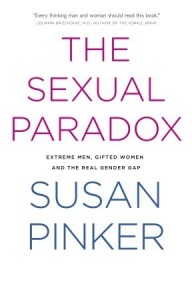 I had the good fortune to meet Susan Pinker, Montreal-born psychologist, journalist, author and brother of Steven Pinker, at a talk she gave to promote her most recent book, and though our brief encounter didn’t get beyond pleasantries, I had already formed a strong admiration of her based on her journalism. Looking back, I am sorry that I had not already read The Sexual Paradox, winner of the American Psychological Association’s Williams James Award; I would have congratulated her on its reception and praised her courage in tackling what has become one of modern society’s most entrenched taboos: gender differences between men and women.
I had the good fortune to meet Susan Pinker, Montreal-born psychologist, journalist, author and brother of Steven Pinker, at a talk she gave to promote her most recent book, and though our brief encounter didn’t get beyond pleasantries, I had already formed a strong admiration of her based on her journalism. Looking back, I am sorry that I had not already read The Sexual Paradox, winner of the American Psychological Association’s Williams James Award; I would have congratulated her on its reception and praised her courage in tackling what has become one of modern society’s most entrenched taboos: gender differences between men and women.
The phrase “the sexual paradox” is not Pinker’s coinage; it is widely used to refer to instances where women confound the expectations of sociologists by behaving unlike men. So, for example, it is considered a paradox that the freer and more wealthy a country becomes, the wider the gulf between the behaviors of its male and female citizens. The Scandinavian countries – paragons of “gender equality” by whatever abstruse definition is currently in vogue among people who measure such things – graduate fewer female engineers than Iran, for example; countries that offer generous maternity policies, designed to coax more women into the workforce, succeed in creating an army of women employed part-time, while it is America, with no state-funded maternity leave, that succeeds in promoting women to the highest levels of corporate office.
Drawing on the latest findings from endocrinology and neuroscience, Pinker examines neurological disorders like autism and ADHD, which (borrowing an argument from Simon Baron-Cohen) she posits are extreme examples of the male brain, examples that, while extremely debilitating, may also confer unlikely benefits – in mathematics, analytical reasoning and memory, for example – that help explain male achievement. This is unwelcome news to many who have made whole careers in academia and journalism castigating Western society for its supposedly entrenched sexism, so Pinker does an admirable job marshaling evidence and being careful not to overstate her case. I am, however, more interested in the other side of her argument, too often neglected in the larger discussion: men succeed in larger numbers because, as it turns out, they fail in larger numbers as well. Our prisons and homeless shelters are filled to the brink with overwhelmingly male occupants, and the suicide rate in every Western country is a staggering 80% male. Our inability to discuss the ways in which men are weak stems directly from our unwillingness to honestly confront their strengths, and Pinker shows greater empathy than most in addressing what many have called a crisis in modern masculinity.
Pinker also does an admirable job wading through the data and showing the bankruptcy of received wisdom when it comes to contemporary gender dynamics, but she too shies from the larger quarrel; rather than hacking away at the root of misinformation, she contents herself with cutting off each flowering falsehood. This focus makes The Sexual Paradox compelling reading, particularly for the uninitiated, but it cripples its effectiveness in actually combatting these entrenched falsehoods, which have shown a remarkable resilience in the face of competing evidence.